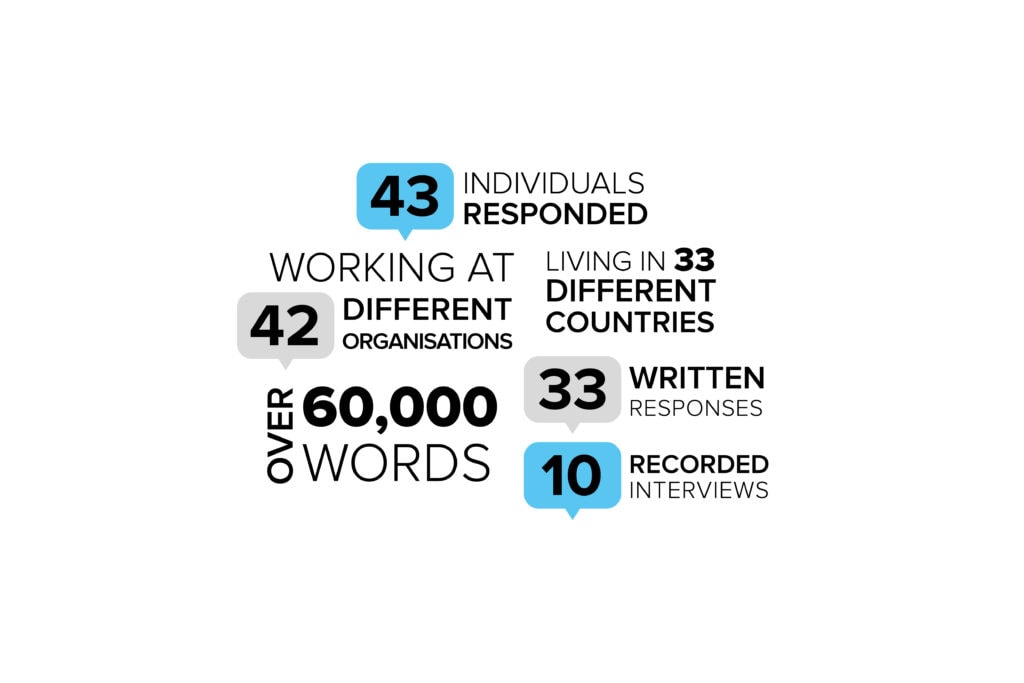“How can we capture and leverage what we’ve learned so far? By documenting our experiences during COVID-19, and the activities of our respective civil society organizations, and looking at our own personal experiences, and sharing them.”
 How it began
How it began
In early 2020 we started to hear more about a virus that was causing problems in China.
While it was a disturbing story, it didn’t seem to be having a direct impact on the issue we remained firmly focused on: supporting the work of our members to counter the increasing attacks on the right to freedom of expression and information coming from many quarters – some all-too-familiar, and others relatively new – around the globe.
That attitude changed, quickly.
By March, the realisation that our best-laid plans might be about to change had hit home. As we described it shortly after in an Op Ed: “For many of us, the reality of COVID-19 went from being a distant tremble on the horizon to a full-on earthquake, in very little time.”
As a global human rights network, our first thought here at IFEX was to reach out to member organisations – over 100, in over 60 different countries. We asked: How are you? How is this affecting you? What are your priorities now, in the face of all this?
“What have I learned? I learned not to take anything for granted… that my parents are cool and funny, and that I have a need for interaction with people and friends. I learned that working from home isn’t fun, and that I miss my colleagues and office desk. But above all, I learned that I need to learn how to spend time alone – not out of need, but rather to discover my likes and dislikes.”
Lucie Doumanian, Operations Manager, Social Media Exchange (SMEX), Lebanon)
“Reducing travel brought more time to reflect on our work, and to think about more innovative and creative ways of doing it – and to do this reflection with colleagues. Traveling and meeting people in person certainly brings benefits, and it is necessary, but I think the pandemic has shown that in some cases we might be able to achieve the same goals without it.”
Silvia Chocarro, Head of Protection, ARTICLE 19, France
 Why document our stories?
Why document our stories?
The significance of this moment in history, its impact on our work, as well as how the crisis has underscored the need for a strong, vibrant civil society, inspired us to try to document members’ impressions and responses. It will provide a historical record of the impact of the pandemic on members and capture some of the creative responses in dealing with the challenges.
We believe that the act of collecting and sharing members’ stories will strengthen the solidarity that is so important to this network. Members will be able to read about some of the challenges others have faced, and how they’ve overcome them. Excerpts from their stories may help put a human face on what so many civil society organisations are going through, around the globe, and counter some of the negative narratives being promoted by authoritarian states.
“One really important thing IFEX did during this crisis was to contact every member asking whether they were ok, and if there was anything IFEX could do to ease the situation. That meant so much and was so encouraging. And I think that it really will pay off in the long run, cooperation-wise, as we all feel more tightly knitted together in the same community.”
Hege Newth Nouri, Secretary General, Norwegian Pen, Norway
“Last year we felt that, because of the plebiscite and the overall security situation in the country, people were feeling stressed. We were thinking about what to do to react to that process, and one option we considered was psychological support. But when COVID happened, it was a breaking point – if we were considering it before, now we needed it. So we moved to arrange it.”
Carolina Botero, Executive Director, Karisma, Colombia
 The invitation
The invitation
In May 2020, two months after the World Health Organisation officially announced the pandemic, we wrote to all IFEX members, and asked them if they’d be interested in sharing some of the personal and professional impacts the pandemic was having on them. In June, we followed up directly with those who had expressed interest, and then we documented their responses over the summer.
We sought diversity in terms of the gender and professional roles of the respondents. We invited people to reply by telephone, email, WhatsApp, or any other channel they preferred, and in any language. Some responses were recorded and transcribed.
“I feel that the pandemic has created new problems when it comes to the core rights we work for – freedom of expression and privacy. These challenges are constantly changing, but I feel like people are slowly realising how important the internet is – and by extension digital rights – and that opens up avenues for advocacy and awareness. It is up to us, digital rights and civil society actors, to make sure we make people understand that spending more time online means that we also have to push for fairer, more transparent and rights-centric systems for these spaces.”
Shmyla Khan, Director of Research and Policy, Digital Rights Foundation, Pakistan
“We had to change our approach to doing our work… It became frustrating, because we’re dealing with different stakeholders, but also from different generations: young people who are tech savvy, as well as people from the older generation who don’t understand the digitalisation of things and the internet. Yet both are key stakeholders that we have to engage with.”
Ruth Namara, Advocacy and Communications Officer, Africa Freedom of Information Center, Uganda
 The response
The response
Despite the stresses members were under, or perhaps, in some cases, because of it, many wanted to share their stories. By the end of the summer of 2020, we had received responses from 43 people living in 32 different countries. Over half of the responses were from women.
Members wrote to us, or spoke with us, from Albania, Argentina, Austria, Bahrain, Bolivia, Cambodia, Cameroon, Canada, Colombia, France, Germany, Hungary, Lebanon, Liberia, Mongolia, Nepal, Norway, Pakistan, Palestine, Papua New Guinea, Peru, Romania, Scotland, South Africa, Sri Lanka, The Netherlands, The Philippines, Uganda, England, Uruguay, the United States, and Zimbabwe.
A fascinating variety of responses – not unexpected from such a diverse network! Some were in-depth, some point-form. Some took a philosophical tone, others focused on the tangible. Some shared more about how they felt, and others on the impact of the pandemic on their organisation.
Each of their stories sheds light on the creativity and resilience of this unique global network, whose work on the right to expression and information is more essential than ever.

“Solidarity among the media community and other stakeholders became extraordinarily strong, despite the limitations brought by the pandemic. Because everything was halted, everyone has time to focus on the effectiveness of our current government, or the lack thereof. So when the administration started implementing repressive rules, people started to be aware of their rights and started speaking of it. We have seen joint statements, social media campaigns and other activities that united the media community and many Filipinos.”
Penzer R. Baterna, Staff writer/Reporter, Centre for Media Freedom and Responsibility, Philippines
“The evolution of the epidemiological situation stopped us from implementing the annual Palestine Digital Activism Forum, which attracts local and foreign experts. We had two options: cancel the conference, or proceed and turn it into a fully digital forum. We decided to try experimenting by taking activities online. We managed to break the isolation barrier imposed by the virus, with views of the virtual sessions reaching more than a million, engagement from over 50,000 followers, in addition to reaching more than half a million users.“
Munya Thaher, Media Intern, 7amleh, Palestine
 Common threads
Common threads
While the responses came from so many unique individuals, working in different organisations, in different countries, and living unique lives, there were common threads that are helping us better understand the impact of this pandemic on this network, and on civil society more broadly; why it is so important to ensure it survives, and thrives, and how best to support it.
- The work these organisations do – promoting and defending the right to freedom of expression and information – is more essential than ever in responding to a pandemic;
- The health crisis came with accelerated challenges to freedom of expression and information, often carried out under the guise of considerations of public safety;
- While moving programming online made things more inclusive in some instances, it threw up new obstacles in others, due to inequality of internet access, cost, technical challenges, security issues with online communications, digital literacy variations in different groups of stakeholders;
- Members’ commitment to continually adapting, learning, and collaborating helped them respond creatively when they realized that planned in-person meetings and trainings did not just translate straightforwardly into digital interactions;
- The importance of providing psychological support to those working in civil society, and not just during a global health crisis, must be acknowledged. International solidarity and local, regional and global networks are very important for this.
“Governments have had to implement restrictive measures for the safety of everyone, but we cannot ignore the fact that some governments have abused their power to intensify repressive measures, including increased surveillance and restrictions on free expression and information. This should be motivation for civil society to continue fighting for these crucial rights.”
Nedal Al-Salman, Acting President, Bahrain Center for Human Rights, Bahrain
“You can now really do very ambitious events online and expect everyone to play ball. That’s great. But I think we are already seeing the limits of working only online and from home. Our worlds and mindsets seem to have simultaneously shrunk and expanded. I suspect we will soon start discovering that ideas and action that spring from online and in-person interaction are different in some important ways, and that we will want to exploit both.”
Tihomir Loza, Executive Director, South East Europe Network for Professionalisation of Media, Hungary
 Moving forward
Moving forward
This project captured some IFEX members’ impressions and responses during the very early months of the pandemic.
What came across loud and clear is that the people working in civil society organisations are trying to overcome hurdles that we can all relate to, while continuing to promote and defend the rights we all depend on.
But the health crisis goes on, as does the story of how the IFEX network is responding to it. We’re using these initial conversations and ongoing check-ins with members to better understand how to work with and respond to their contexts, how to provide solidarity and support, how to build, or tweak programmes, and how to support our goals throughout this ‘new abnormal’.
“Maybe we are not in another world, as many are saying, but surely we find ourselves in a different world, to which we not only must adapt, but also shape. Freedom of expression also takes form in a new context, faces new challenges, perhaps more difficult and complex than before.”
Remzi Lani, Director, Albania Media Institute
